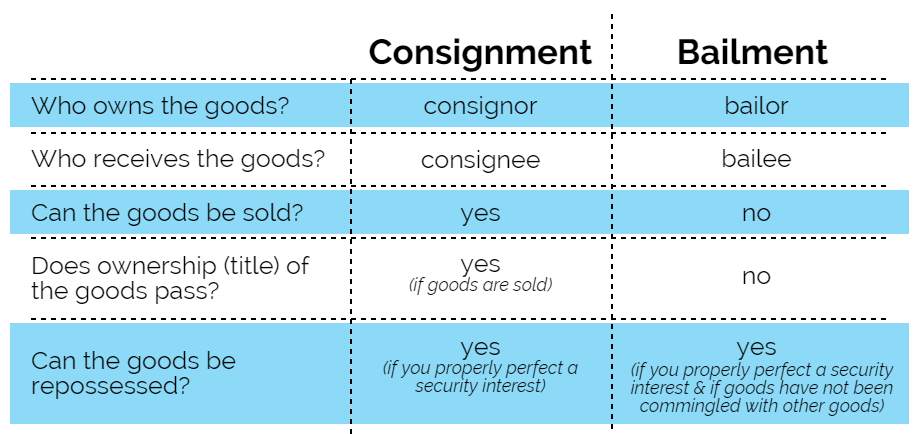Is it a Consignment or is it a Bailment?
Consignment is often confused with Bailment and vice versa. While they are different, they do have similar characteristics. For example, under both consignment and bailment, the ultimate ownership of the goods remains with the party that supplies the goods (consignor/bailor).
In this post, we will take a high-level look at consignment vs. bailment.
Consignment Refresher
We’ve discussed Consignment filings before, but here’s a quick 101:
“A consignment is when the owner (the consignor) retains title to goods delivered to the consignee. The consignee will then hold the goods for sale or use. When the goods are sold, the consignor’s rights attach to the proceeds. If the consignee is not able to sell the goods they can be returned to the consignor without any obligation. The advantage of a consignment sale is that it minimizes the risk of non-payment and can be an option when doing business with a poor credit risk.” – quote from blog post, Protect Your Consignment Sales
What Makes a Bailment Different from Consignment?
Under a bailment agreement, the bailor (owner), delivers its goods to another party (the bailee), “for some express purpose” and once the bailee has fulfilled this purpose, the goods are returned to the bailor.
In other words, a bailment is a transfer of physical possession of the goods, not a transfer of title or ownership of the goods.
“Express Purpose” Could Be to Improve Upon the Original Goods
Here’s an example:
My fictional company, Fan Co., manufactures and sells industrial-sized smart fans.
Fan Co. manufactures all the smart fan parts; however, Fan Co. doesn’t have the equipment needed to assemble and program the motherboards that make their fans “smart.”
So, Fan Co. manufactures all the pieces/parts for the motherboards and hires a third party to assemble and program the motherboards.
Under an agreement between Fan Co. and the third party, the third party will assemble and program the motherboards and send the completed motherboards back to Fan Co.
Fan Co. retains ownership of the pieces/parts, even when they are in the third party’s possession.
Chart it Out
Still a little fuzzy on the difference between consignment & bailment? Maybe this quick chart will help.

Best Practice: Hope for Bailment & Prepare for Consignment
Technically, because a bailment is not a sale of goods, it tends to fall under Article 2 of the UCC, not Article 9.
However, releasing goods to another party, whether the intention is for the goods to be returned or sold, is a risk.
What if the third party files for bankruptcy protection, while in possession of your goods? Even when those goods are slated to be returned to you, if you failed to file a UCC under Article 9, your right to repossess those goods may be in jeopardy. Furthermore, if another creditor filed a UCC on that same entity, their security interest would take priority.
Before releasing goods to a third party, ensure you have a signed security agreement and file a UCC-1.


